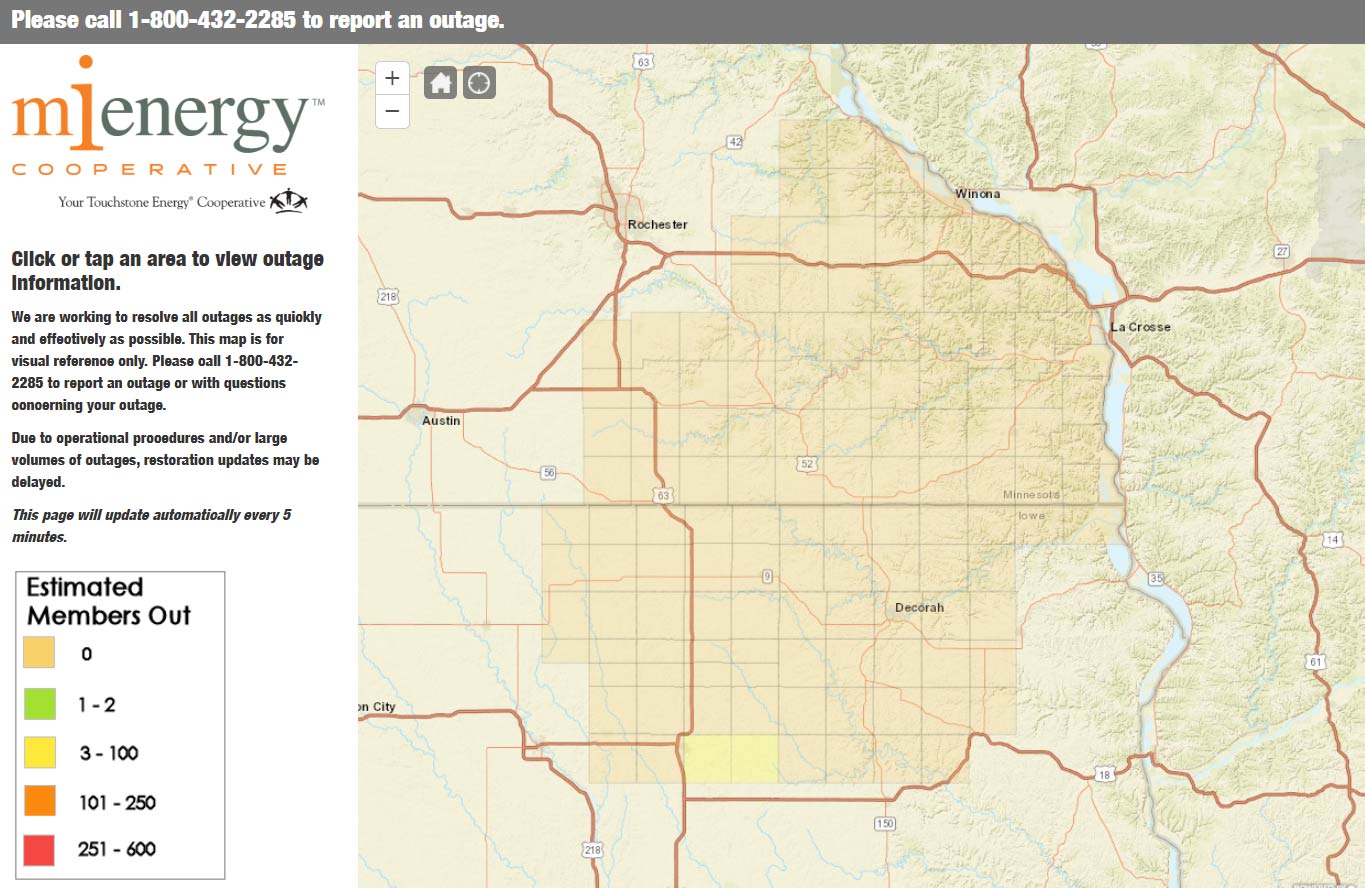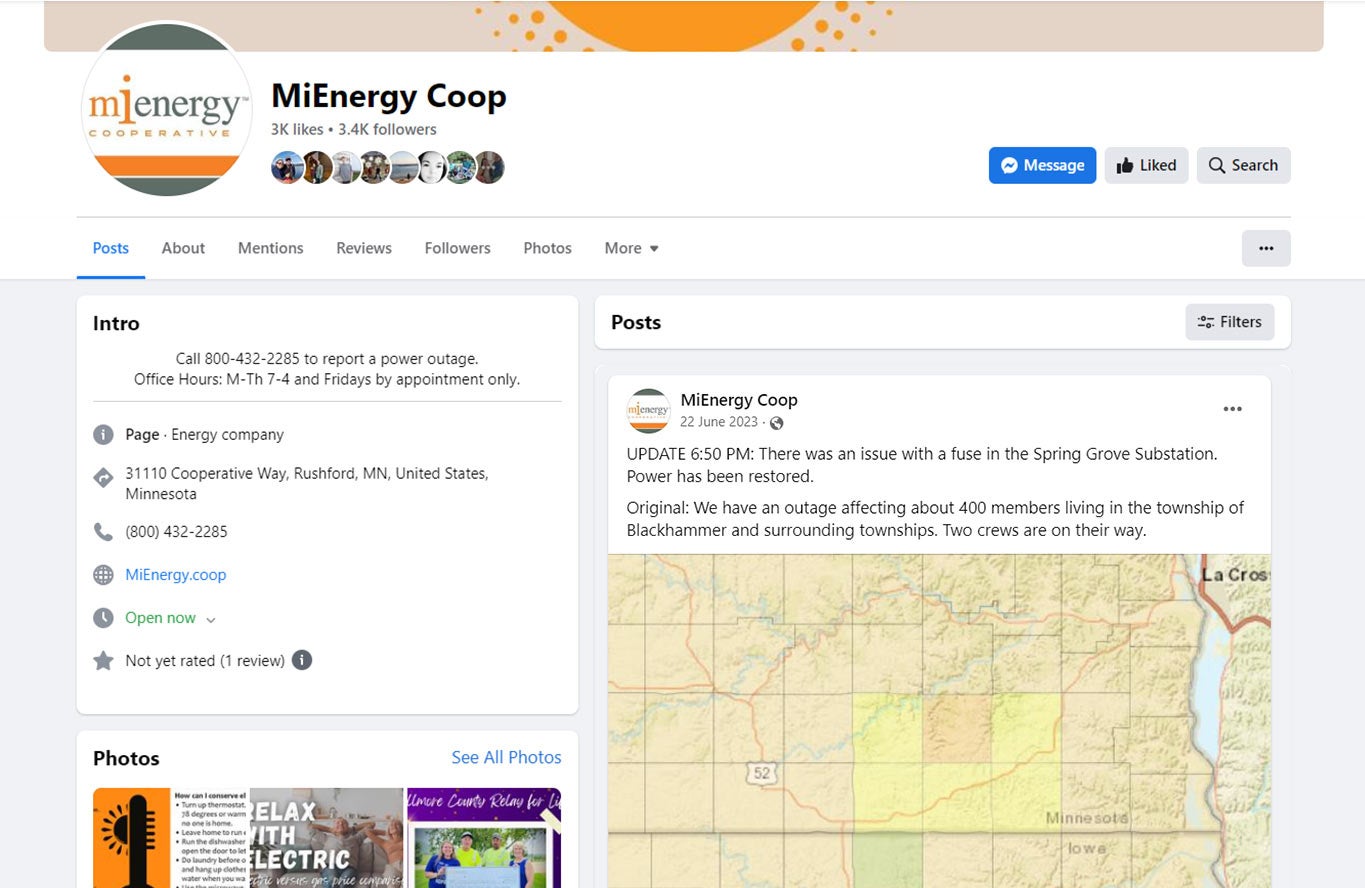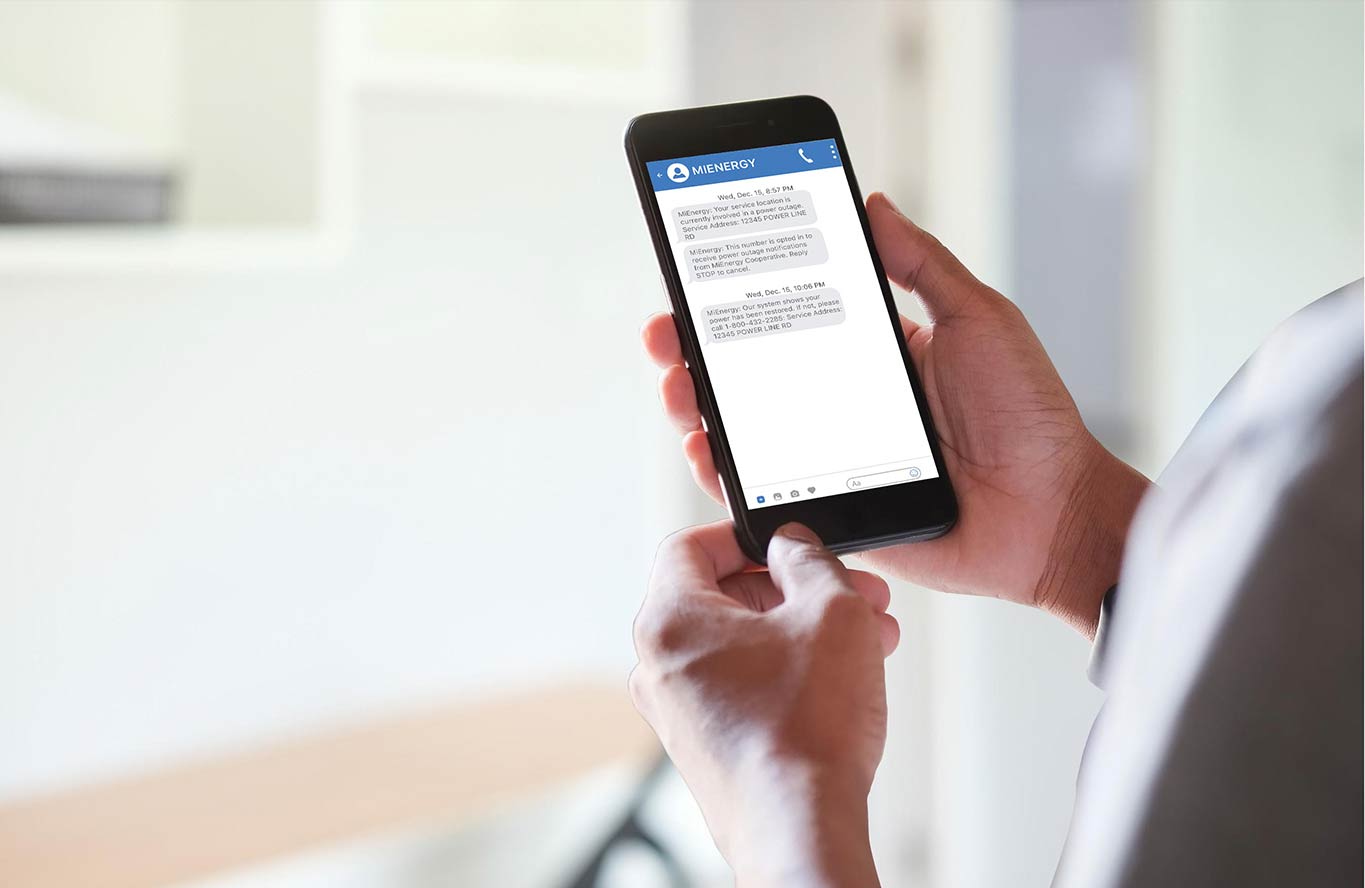If you are experiencing a power outage please report it one of two ways: call 1-800-432-2285 or via MiEnergy's SmartHub.
Depending on the size and scope of the power outages, additional details may be provided on MiEnergy's Facebook page. You can also see areas where power outages are occurring and the number of power outages in real time via our outage maps in the links below.

Outage Maps
In a power outage, use our map to view the current outages in the MiEnergy service territory. You can also view current outages throughout Iowa.
Outage Texts
Members with mobile phones can sign up to receive a text when power is out at their location.

In the event of a widespread outage, you can view updates on MiEnergy's Facebook page.
Whenever a storm or other incident causes damage to MiEnergy Cooperative's electrical distribution system, its primary goal is to get the power back on to everyone safely and in a timely manner.
MiEnergy follows a restoration process that is used by most utilities throughout the industry:
- MiEnergy's first priority is public safety, so crews are sent to remove damaged power lines from the roadways first.
- After that, substation power is restored. Sometimes service to hundreds of members can be restored immediately by replacing a fuse on a substation transformer.
- Next, the major distribution feeders are repaired. These are the power lines that come out of a substation that have three wires resting on a crossarm.
- Tap lines are repaired next. Tap lines carry power to groups of homes from the distribution feeders. You may see your neighbors' lights come on while yours remain out. This happens when a tap line is repaired, but there is still damage to your individual lines, so your home cannot receive power.
- Finally, individual service lines are repaired.
A heavy build-up of ice and snow on power lines can cause wires to snap and utility poles to topple. Falling trees and tree limbs covered in ice can bring down power lines, cause outages, and threaten property, even life.
MiEnergy Cooperative stresses the importance of being prepared and knowing what to do during these potentially dangerous storms and the potential power outages that they may cause.
Having the right supplies and knowing how to stay warm safely are keys to weathering a winter storm emergency, stresses Brad Pecinovsky, MiEnergy's training and compliance coordinator.
Here are some tips for preparing for a winter power outage:
- Always keep a battery-powered radio or TV, flashlights, and a supply of fresh batteries in case of an emergency
- Know where to find extra blankets
- Fill spare containers with water for washing, and keep a supply of bottled drinking water on hand
- Keep a supply of non-perishable food items, along with a hand opener for canned food
- Switch off lights and appliances to prevent overloading circuits and damaging appliances when power is restored. Leave one lamp or switch on as a signal for when your power returns.
- To prevent water pipes from freezing, keep faucets turned on slightly so that water drips from the tap
"Never use a charcoal grill to cook or heat with inside the home," adds Pecinovsky. "Charcoal grills give off deadly carbon monoxide gas. Grills should be used only outdoors."
It's a good idea to assemble a disaster supply kit that includes needed items ahead of time. Don't forget to include a first aid kit, any prescription medications, and any special items needed for infant, elderly or disabled family members.
Maintaining warmth is a priority during a winter emergency. Loss of body heat or hypothermia can be life threatening.
In order to avoid cold weather fatalities:
- Stay inside and dress in warm, layered clothing.
- Close off unneeded rooms.
- When using an alternative heat source, follow operating instructions, use fire safeguards and be sure to properly ventilate.
- Stuff towels and rags underneath doors to keep the heat in.
- Cover windows at night.
- Eat: Food provides the body with energy to for creating its own energy.
- Drink plenty of fluids to stay hydrated.
- Move around to keep warm, but not enough to perspire. Perspiring causes the body to lose fluids which could potentially lead to dehydration.
If you use a standby generator, make sure it has a transfer safety switch or that your power is cut off at the breaker box before you operate it. This prevents electricity from traveling back through the power lines, or what is also known as "back feed." Back feed creates danger for anyone near power lines, particularly crews working to restore power.
When outside, treat all downed and hanging lines as if they are active electric lines: Stay away, warn others to stay away, and immediately contact MiEnergy. Call 1-800-432-2285 to report power outages.
For more information on electrical safety, visit Safe Electricity.
A number of circumstances can cause power interruptions, and damage from severe summer storms can cause extended outages.
If a power outage occurs during hot weather, MiEnergy Cooperative offers steps to maintain comfort and safety until power is restored:
- Many summer power outages are due to severe storms with high winds that topple trees onto utility poles and power lines. It's important to stay clear of downed power lines, and during cleanup efforts, be alert to the possibility that tree limbs or debris may hide an electrical hazard.
- Assume that any dangling wires you encounter are electrical and treat all downed or hanging lines as if they are energized. If you are driving and come upon a downed power line, stay in your vehicle, warn others to stay away and contact emergency personnel or electric utility.
- Also when driving, be careful at intersections where traffic lights may be out. Stop at all railroad crossings, and treat road intersections with traffic signals as a four-way stop before proceeding with caution.
If power to your home is out for a prolonged period, know and understand important safety precautions and steps to cope with heat until power is restored:
- Remember to call your electric utility immediately to report the outage.
- Dress in loose, lightweight clothing, and stay on the coolest, lowest level of your home.
- Use natural ventilation to cool homes.
- Drink plenty of water. Avoid heavy meals, caffeinated and alcoholic drinks.
- Keep fridge or freezer doors closed. A freezer that is half full or full can keep foods frozen 24 to 48 hours. Foods should stay safe in an unopened refrigerator up to four hours. If an outage lasts longer than four hours, remove and pack meat, milk and dairy products in a cooler with ice.
- Use safe, alternative food preparations. A barbecue grill is an excellent way to prepare food, but a charcoal grill should always be used outside.
- Check on friends and relatives—especially children, seniors, and those with medical conditions or disabilities. These people may need to seek emergency cooling shelters.
- Keep a first-aid kit in your home and one in your car. Make sure that it includes scissors, tweezers, safety pins, aspirin, eyewash and rubbing alcohol or hydrogen peroxide.
- Close all drapes and blinds on the sunny side of your residence.
- Take your family and pets to a cool basement location if you have one. Or consider going to an air-conditioned public place during warmer daytime hours.
During an outage, MiEnergy also recommend turning off electrical appliances and unplugging major equipment, including air conditioning, computers and televisions. This will help protect equipment that could be damaged by electrical surges, and prevent circuit overloads when power is restored. Leave one light on to indicate that power has been restored. Wait a few minutes then turn on other appliances and equipment one at a time.
If you use a standby generator, make sure a transfer safety switch is used or connect the appliance(s) directly to the generator output through an isolated circuit before you operate it. This prevents electricity from traveling back through the power lines, what's known as "back feed." Back feed creates danger for anyone near lines, particularly crews working to restore power.
For more information on electrical safety, visit Safe Electricity.


